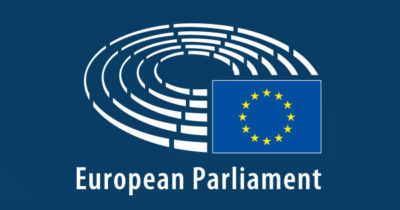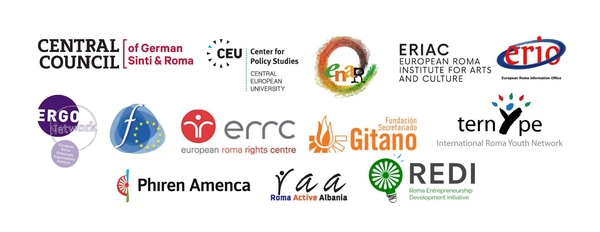PRESS STATEMENT – ALLIANCE AGAINST ANTIGYPSYISM
European Parliament adopts first-ever Resolution proposing a Roma EU legislation to combat antigypsyism and social exclusion of Roma
Brussels 21 September 2020: The Alliance against Antigypsyism welcomes the adoption by the European Parliament of a resolution on the implementation of National Roma Integration Strategies initiated by MEP Romeo Franz (Greens/EFA) demanding for a legislative act for Roma equality, inclusion and participation and for combating antigypsyism, focusing on “fighting against poverty and antigypsyism, improving living and health conditions and combining targeted and mainstream approaches”.
The proposed legislative act intends to include, among other things, a plan to eliminate housing, health, employment and education inequalities, specific objectives to protect and improve the inclusion of Roma people, including those facing multiple discrimination and concrete measures to combat discrimination and segregation both in EU Member States and Enlargement Countries.
ERGO Network Director Gabriela Hrabaňová called the proposal for a Roma Directive “an important recognition of the systematic failure by the EU and governments to address the structural and systemic antigypsyism Roma are facing across the EU and Western Balkans” and a “turning point in the EU’s approach towards Roma”.
”After the recognition of the Holocaust of 500,000 Sinti and Roma in Nazi-occupied Europe by the European Parliament in 2015, with the resolution now adopted, this Parliament shows once again its determination to condemn and fight the threatening antigypsyism in Europe.”, says Romani Rose, chairman of the Central Council of German Sinti and Roma.
Michael Privot, Director of the European Network Against Racism (ENAR), adds that “The resolution and the new EU action plan against racism are different steps on the road towards more equality for all. We now need EU member states to adopt concrete measures and plans against racism, including antigypsyism, at national level.” .
Inter alia, the Resolution:
- calls for the recognition of antigypsyism as a specific form of racism against Roma, equal access to justice and equality before the law;
- highlights the need for systematic collection of robust ethnic and gender disaggregated data to inform needs and context analysis, help in setting targets and impact indicators;
- urges Member States to adopt a holistic approach across all policy areas, to place the education of Romani children high on governments’ agendas and put an end to segregation;
- calls on the Commission to fulfil its commitment to adopt an action plan to implement the European Pillar of Social Rights and to incorporate Romani inclusion as an indicator in the Social Scoreboard;
- urges the Commission and the Member States to ensure access to decent jobs, fair wages and working conditions for Romani people and to guarantee that social protection systems and social services are adequate, accessible and used by all potential beneficiaries, and include universal health coverage without discrimination, as well as minimum income schemes and pension rights;
- calls on the Member States to adopt urgent measures to address the lack of water, adequate sanitation, electricity and needed infrastructure in poor Romani communities in the light of the Covid-29 crisis;
- calls on the Member States to fully include Romani settlements in disinfection measures, to prohibit the cancellation of basic utility services during the pandemic, to consider subsidizing consumption costs for the most vulnerable and those who have lost incomes, or freezing payments until the end of the recovery plan period, to provide financial support for lone parents/single mothers for childcare, rent payments and other household expenses to alleviate the financial hardship, especially in light of the job losses;
- stresses the need to give priority to a gender perspective and gender-sensitive policies and fight violence (including human trafficking);
- calls on mobilising funding for Romani equality, inclusion and participation under the Multi-Annual Financial Framework 2021-2027 and EU Recovery Plan and to adjust the existing mainstream financial mechanisms and make them flexible for blended use of funds in Romani communities by enabling access to information, outreach, capacity building and delivery of technical assistance;
- demands equal participation of Roma in all domains of public life, political participation, and the language, arts, culture and history by making Romani participation a binding common quality standard for the future framework and National Inclusion Strategies;
- calls for an inclusive mechanism to ensure the equal participation of Roma and pro-Roma civil society organisations, experts and community members from all levels, taking into account a gender perspective in the policy debate and decision-making.
For further information, contact:
ERGO Network: Jamen Gabriela Hrabanova, Executive Director, g.hrabanova@ergonetwork.org – Tel: +32(0)2 893 10 49
Central Council of German Sinti and Roma: Jonathan Mack, Policy Officer, jonathan.mack@sintiundroma.de – Tel: +49 (0) 6221 981101
Notes to the editor:
- The ‘Alliance against Antigypsyism’ is a coalition of organisations across Europe that promote equality of rights for Roma and combat antigypsyism on institutional and societal level. The aim of the Alliance is to advance understanding of antigypsyism as a specific form of racism, and to strengthen the political will and institutional mechanisms in order to tackle antigypsyism in Europe. The Alliance is coordinated by the European Roma Grassroots Organisations (ERGO) Network, the European Network against Racism (ENAR) and the Central Council of German Sinti and Roma.
- Link to the adopted Resolution: https://www.europarl.europa.eu/doceo/document/A-9-2020-0147_EN.html





